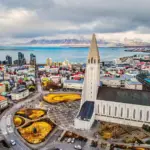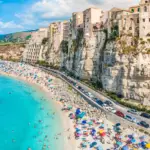
Introduction
When thinking about taking a few days off, many people immediately associate it with vacation. However, it's important to understand that there's a fundamental difference between traveling and simply taking a vacation.
In this article, we'll explore this significant distinction and discuss the importance of understanding it. While vacations can be seen as a time to relax and completely disconnect from daily responsibilities, traveling offers a unique opportunity for exploration, learning and personal growth.
Reevaluating Traditional Vacations
Often, when someone decides to take a vacation, the predominant idea is to escape the exhausting routine of work or family commitments. Vacations are seen as a necessary break to recharge and enjoy leisure time. It's a time to sit by the resort pool, relax on the beach, or even stay home and watch movies all day.
However, while traditional vacations focus primarily on physical and mental rest, many fail to realize that this can lead to a passive state where there is little engagement or pursuit of novelty. While it may provide some temporary relief from everyday stress, this type of break often fails to provide a truly enriching experience.
The enriching essence of traveling
On the other hand, traveling is an experience completely different. When traveling, there's a more active attitude and a search for something more than just relaxation.
Traveling involves exploring new places, immerse ourselves in different cultures, and broaden our personal horizons. By choosing to travel, we open ourselves up to the possibility of learning about the world and ourselves.
It's an opportunity to appreciate the planet's diversity, experience different flavors, hear unfamiliar languages, and witness unique traditions. Traveling isn't just about visiting famous landmarks; it's about engaging with locals, understanding their perspective, and discovering what truly makes each place tick.
Therefore, it's crucial to understand the difference between traveling and taking a traditional vacation. By doing so, we can open ourselves up to transformative experiences that will allow us to grow as individuals and enrich our lives in unimaginable ways.

Holiday Overview
The search for rest and relaxation
When thinking about vacation, the first image that comes to mind is that of a well-deserved break after long periods of hard work. Vacations are seen as a break from the daily grind, allowing people to disconnect from stress and reconnect with themselves.
It's a time to recharge and revitalize the mind and body. During the holidays, people seek to relax as much as possible, escaping the responsibilities and deadlines imposed by everyday life.
Recreational activities and free time
Another important aspect of the vacation is the focus on recreational and free time activitiesDuring this period, people have the freedom to choose how they want to spend their time without restrictions or rigid commitments.
Whether it's relaxing on a pristine beach, hiking lush trails, or simply enjoying a good book by the pool, vacation recreational activities are designed to provide immediate pleasure and instant gratification without requiring significant physical or mental effort.
Exploration of personal freedom
Furthermore, during vacations, we often experience a liberating sense of personal autonomy. There are no strict schedules to adhere to or expectations to meet other than our own desire for satisfaction.
During this time, we have the opportunity to dedicate ourselves to what brings us joy and genuine pleasure, without the obligation to meet society's demands or external expectations. The holidays are a time to allow ourselves to be truly free and do what makes us happy.
This overview of vacations highlights their relaxing nature, their focus on recreational activities and free time, and the sense of personal freedom they offer. However, as we'll see in the following sections, traveling goes beyond these aspects and involves a different mindset for a more enriching and transformative experience.

The meaning of traveling
When we talk about traveling, we're referring to much more than simply moving from one place to another. Traveling is a journey that transcends physical boundaries and takes us to explore new places and cultures, expanding our horizons in unimaginable ways.
The journey to discover new places
When we embark on a journey, we open the doors to fascinating discoveries. Each destination offers its own history, distinctive architecture, and stunning landscapes. Through travel, we have the opportunity to marvel at the grandeur of the world and connect with unique places that broaden our perspective.
Emphasis on immersion in authentic experiences
One of the main differences between taking a vacation and traveling is the search for authentic experiences. While on vacation we can opt for standardized tourist activities, on a trip we seek to immerse ourselves in local culture and experience the traditions, gastronomy and way of life of the inhabitants of the region visitedIt is through this deep immersion that we can truly understand the spirit of a place and enrich our experience.
When we travel, we make room to absorb the new environment in every way: experiencing exotic local flavors, learning words in unfamiliar languages, or participating in traditional festivals and celebrations.These authentic experiences are enriching, sparking a deep emotional connection and transforming us in profound ways.
Differences in mindset between vacation and travel
When comparing vacation and travel mindsets, it becomes clear that there is a fundamental difference in how we approach these experiences. While vacations are often seen as a time to relax and disconnect from routine, travel has a more active and exploratory nature.
Comparing the Passive Vacation Mindset to the Active Travel Mindset
On vacation, we tend to adopt a passive attitude, seeking comfort and immediate pleasure. Our priority is to relax and have fun, often through pre-planned activities at resorts or hotels. On the other hand, when traveling, we adopt an active mindset; we're willing to step outside our comfort zone to explore new places and cultures.
While on vacation we can be content to just enjoy what is available where we are staying, traveling we seek adventure and authentic experiences outside of this controlled environment. The active travel mindset encourages us to interact with locals, sample traditional cuisine, and explore historical or natural landmarks.
Discussion about seeking adventure, personal growth, and learning while traveling
One of the main motivations for traveling is seeking adventure. While on vacation, the search for excitement often takes a back seat, when traveling, we feel compelled to explore unfamiliar places, immerse ourselves in extreme activities, and face challenges. This willingness to venture out allows us to experience exciting moments and create lasting memories.
Furthermore, travel offers significant potential for personal growth and learning. By leaving our comfort zone and immersing ourselves in new cultural environments, we are exposed to different perspectives on life and forced to question our own beliefs and values.
Interacting with people from diverse backgrounds allows us to develop social skills such as empathy and adaptability. We not only learn about other cultures while traveling, but also about ourselves.
By facing challenges outside our usual routine, we discover our hidden strengths and develop greater confidence in our abilities. Travel offers fertile ground for personal growth, allowing us to expand our mental and emotional horizons.
Planning and preparing for vacation vs. travel
The difference between a structured schedule and an unknown adventure. When comparing planning and preparing for vacations and travel, it becomes clear that these two experiences have distinct approaches.
When it comes to vacations, it's common to follow a structured and predictable schedule. People typically book hotels in advance, plan daily itineraries for tourist activities, and even make reservations at specific restaurants.
This process is designed to ensure a peaceful and worry-free period of rest. Conversely, when traveling, the emphasis is on unknown adventure.
Planning can be more flexible, allowing travelers to explore different paths and discover new destinations throughout the journey. Preparation involves researching the local culture, must-see sights, and transportation options available at your chosen destination.
However, there is also expected to be room for spontaneity during the trip.
From pre-defined itineraries to endless possibilities
In the context of traditional vacations, many choose to follow pre-defined itineraries that cover the main tourist attractions of their chosen destination. Itineraries are organized based on popular reviews in travel guides or reliable online suggestions.
This approach provides a sense of security and certainty about what to expect during your stay. However, when it comes to travel, the possibilities are nearly endless.
Travelers can choose to explore lesser-known destinations, escape the usual tourist routes, and seek out authentic experiences.Instead of following a pre-defined itinerary, travelers have the freedom to follow their own path, allowing them to discover hidden places and interact with the local culture on a deeper level.

The balance between comfort and challenge
During traditional holidays, comfort is a priorityTravelers typically seek full-service accommodations where they can relax and enjoy luxurious amenities. Logistics are carefully planned to minimize stress and provide a worry-free experience.
On the other hand, when traveling, there is an element of challenge involved.Travelers are willing to step out of their comfort zone in search of new perspectives.
This could mean staying in simple hostels or makeshift campsites and exploring destinations remote and unknown. The essence of travel is to open yourself to the unknown and embrace the surprises that arise along the way.
Conclusion
In short, while taking a vacation offers a peaceful and predictable period of rest and leisure, traveling provides a more enriching and challenging experience.
When comparing the planning and preparation for these two experiences, it becomes clear that vacations are generally more structured and predictable, while travel is characterized by a greater degree of adventure and openness to the unknown. Both approaches have their merits, but the choice between traveling and taking a vacation depends on the individual's mindset in search of a unique and meaningful experience.
Lucas Wanderlust has a tireless spirit of adventure, always seeking new travel experiences. Fascinated by the world and the possibility of exploring unknown destinations, he fell in love with the sense of freedom and self-discovery that traveling alone provides. With a backpack on his back and a heart open to the unknown, Lucas embarks on exciting journeys, where each destination becomes a unique chapter in his life story. He gives himself body and soul to the magic of solo travel, inspiring others to follow in his footsteps and discover themselves through adventure.







